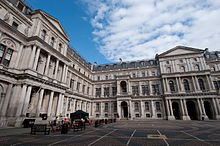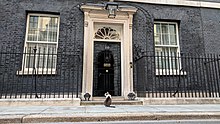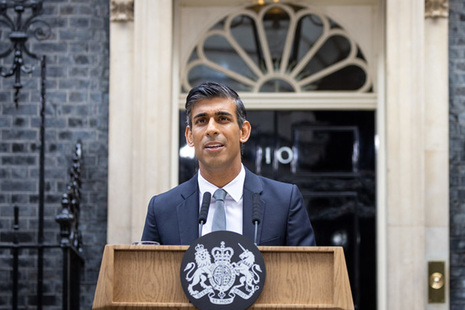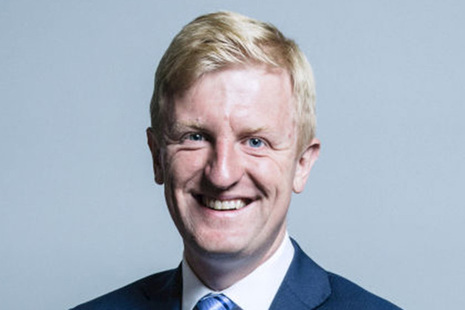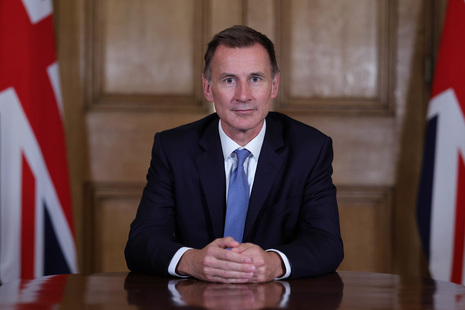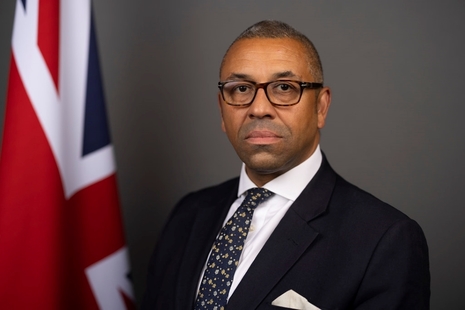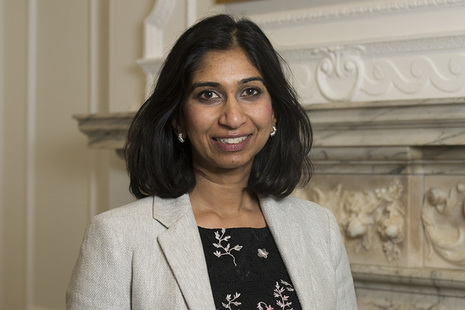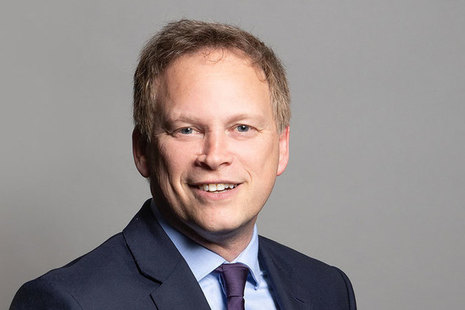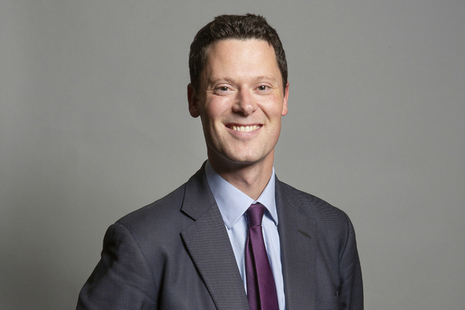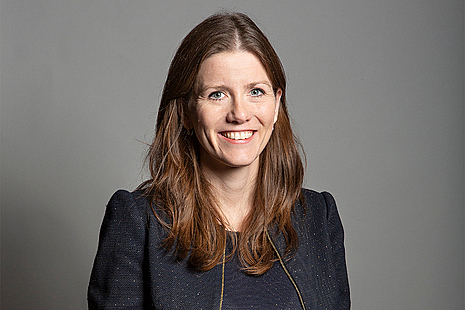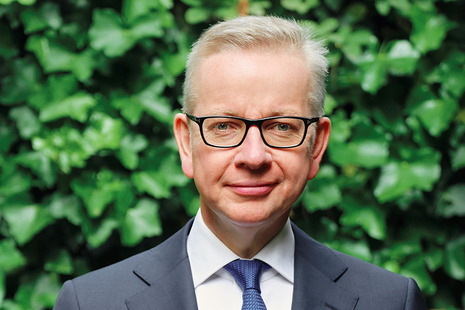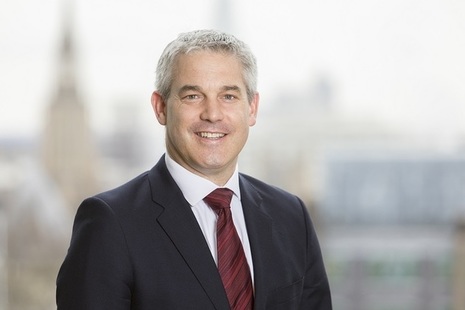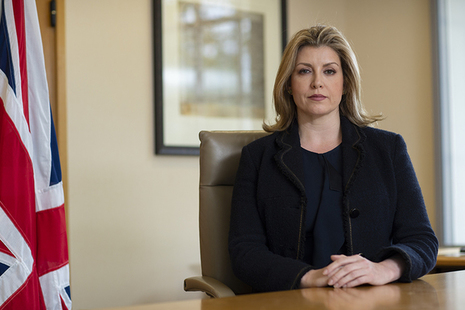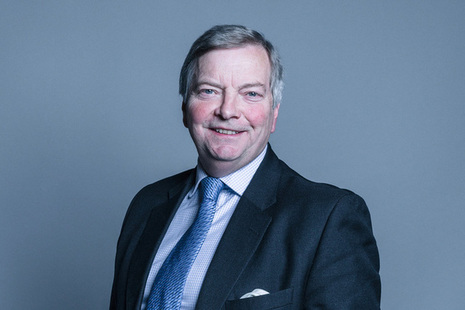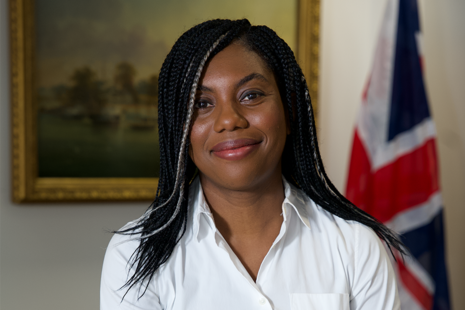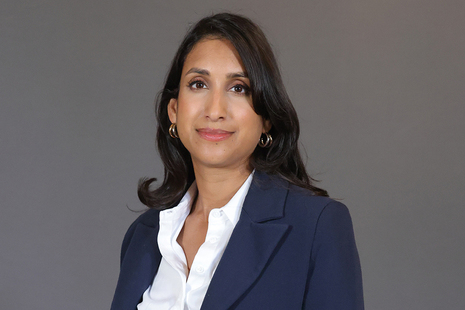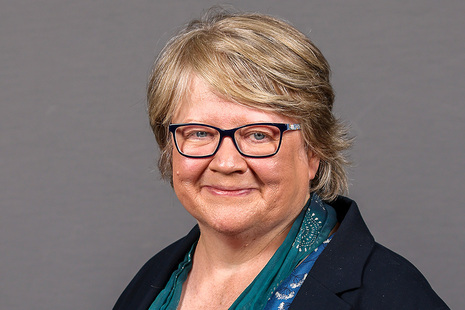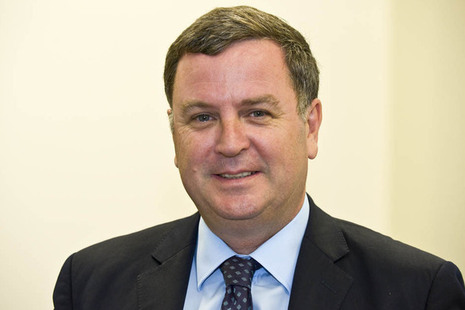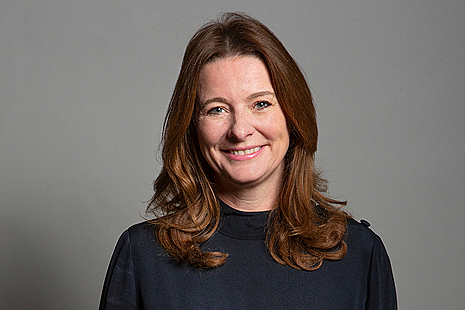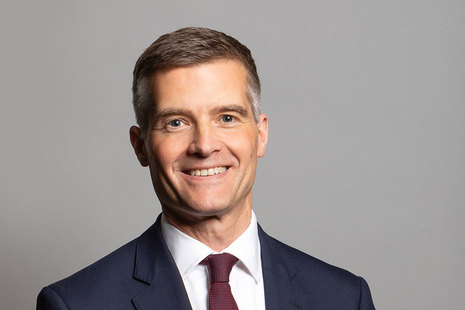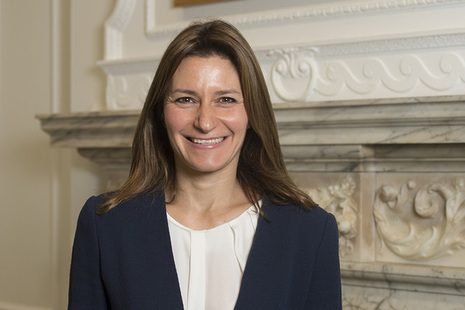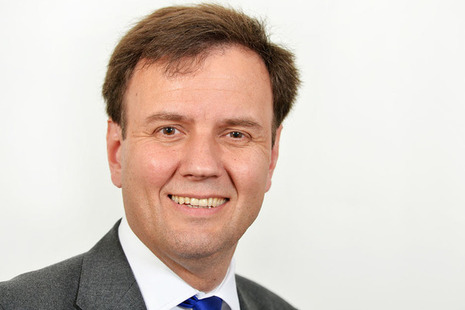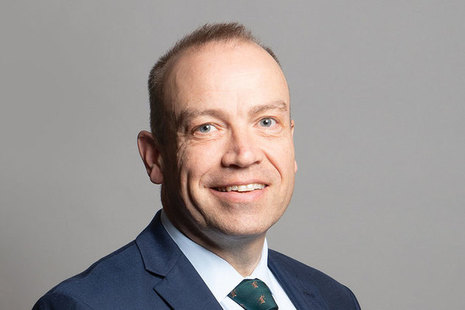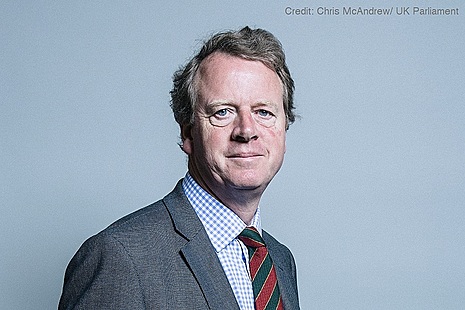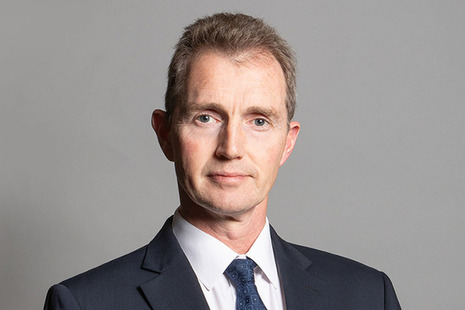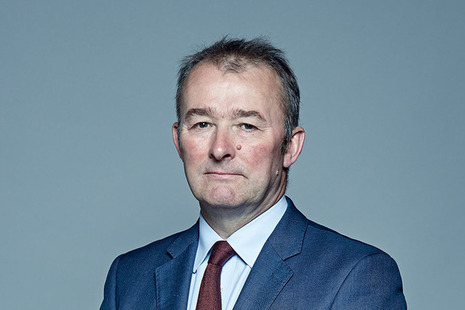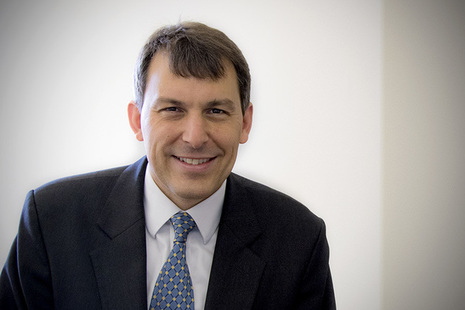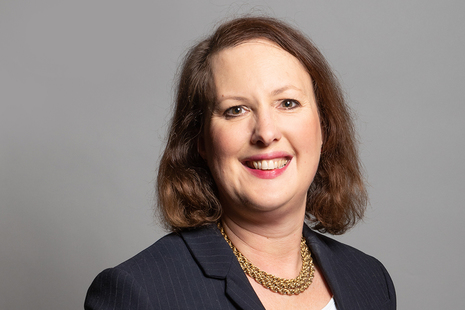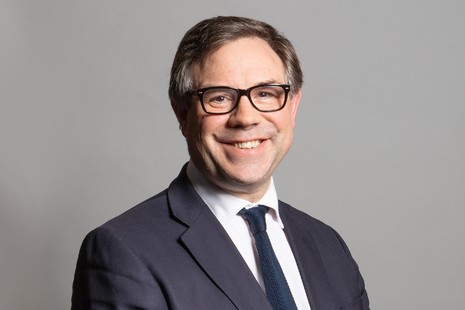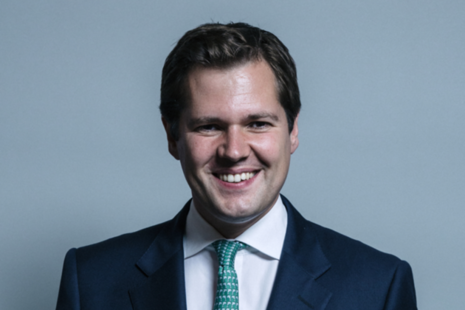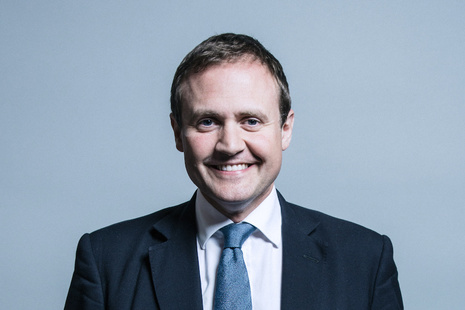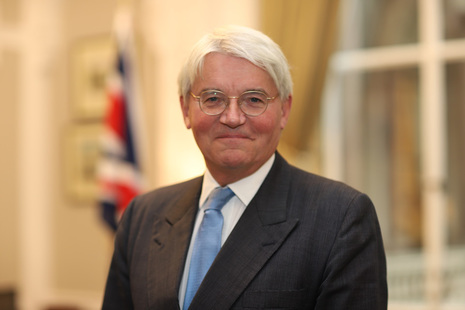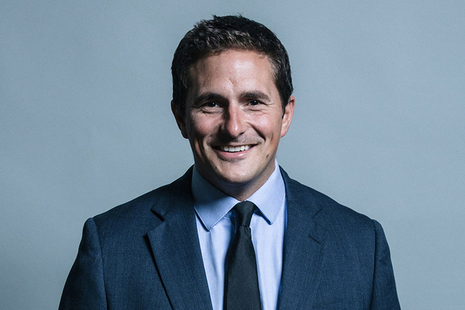From Wikipedia, the free encyclopedia
This article is about the way the UK is governed. For the people in the current British administration, see British Government frontbench.
| His Majesty’s Government | |
|---|---|
| Welsh: Llywodraeth ei Fawrhydi Irish: Rialtas a Shoilse Scottish Gaelic: Riaghaltas a Mhòrachd |
|
 
HM Government’s logo and wordmark (top), and Royal Arms (bottom) |
|
| Overview | |
| Established | 1707 |
| State | United Kingdom |
| Leader | Prime Minister (Rishi Sunak) |
| Appointed by | Monarch of the United Kingdom (Charles III) |
| Main organ | Cabinet of the United Kingdom |
| Ministries | 23 ministerial departments, 20 non-ministerial departments |
| Responsible to | Parliament of the United Kingdom |
| Annual budget | £882 billion |
| Headquarters | 10 Downing Street, London |
| Website | gov |
His Majesty’s Government (abbreviated to HM Government, commonly known as the Government of the United Kingdom, British Government or UK Government) is the central executive authority of the United Kingdom of Great Britain and Northern Ireland.[1][2] The government is led by the prime minister (currently Rishi Sunak, since 25 October 2022) who selects all the other ministers. The country has had a Conservative-led government since 2010, with successive prime ministers being the then leader of the Conservative Party. The prime minister and their most senior ministers belong to the supreme decision-making committee, known as the Cabinet.[2]
Ministers of the Crown are responsible to the House in which they sit; they make statements in that House and take questions from members of that House. For most senior ministers this is usually the elected House of Commons rather than the House of Lords. The government is dependent on Parliament to make primary legislation,[3] and general elections are held every five years (at most) to elect a new House of Commons, unless the prime minister advises the monarch to dissolve Parliament, in which case an election may be held sooner. After an election, the monarch selects as prime minister the leader of the party most likely to command the confidence of the House of Commons, usually by possessing a majority of MPs.[4]
Under the uncodified British constitution, executive authority lies with the sovereign, although this authority is exercised only after receiving the advice of the Privy Council.[5] The prime minister, the House of Lords, the Leader of the Opposition, and the police and military high command serve as members and advisers of the monarch on the Privy Council. In most cases the cabinet exercise power directly as leaders of the government departments, though some Cabinet positions are sinecures to a greater or lesser degree (for instance Chancellor of the Duchy of Lancaster or Lord Privy Seal).
The government is sometimes referred to by the metonym «Westminster» or «Whitehall», as many of its offices are situated there. These metonyms are used especially by members of the Scottish Government, Welsh Government and Northern Ireland Executive in order to differentiate their government from His Majesty’s Government.
History[edit]
The United Kingdom is a constitutional monarchy in which the reigning monarch (that is, the king or queen who is the head of state at any given time) does not make any open political decisions. All political decisions are taken by the government and Parliament. This constitutional state of affairs is the result of a long history of constraining and reducing the political power of the monarch, beginning with Magna Carta in 1215.
Since the start of Edward VII’s reign in 1901, by convention the prime minister has been an elected member of Parliament (MP) and thus answerable to the House of Commons, although there were two weeks in 1963 when Alec Douglas-Home was first a member of the House of Lords and then of neither house. A similar convention applies to the position of chancellor of the exchequer, as it would probably now be politically unacceptable for the budget speech to be given in the House of Lords, with members of Parliament unable to question the Chancellor directly. The last chancellor of the exchequer to be a member of the House of Lords was Lord Denman, who served for one month in 1834.[6]
His Majesty’s Government and the Crown[edit]
The British monarch is the head of state and the sovereign, but not the head of government. The monarch takes little direct part in governing the country and remains neutral in political affairs. However, the authority of the state that is vested in the sovereign, known as the Crown, remains as the source of executive power exercised by the government.
In addition to explicit statutory authority, the Crown also possesses a body of powers in certain matters collectively known as the royal prerogative. These powers range from the authority to issue or withdraw passports to declarations of war. By long-standing convention, most of these powers are delegated from the sovereign to various ministers or other officers of the Crown, who may use them without having to obtain the consent of Parliament.
The prime minister also has weekly meetings with the monarch, who «has a right and a duty to express [their] views on Government matters … These meetings, as with all communications between the king and his Government, remain strictly confidential. Having expressed his views, the king abides by the advice of his ministers.»[7]
Royal prerogative powers include, but are not limited to, the following:
Domestic powers[edit]
- The power to appoint (and in theory, dismiss) a prime minister. This power is exercised by the monarch personally. By convention they appoint (and are expected to appoint) the individual most likely to be capable of commanding the confidence of a majority in the House of Commons.
- The power to appoint and dismiss other ministers. This power is exercised by the monarch on the advice of the prime minister.
- The power to assent to and enact laws by giving royal assent to bills passed by Parliament, which is required in order for a law to become effective (an act). This is exercised by the monarch, who also theoretically has the power to refuse assent, although no monarch has refused assent to a bill passed by Parliament since Queen Anne in 1708.
- The power to give and to issue commissions to commissioned officers in the Armed Forces.
- The power to command the Armed Forces. This power is exercised by the Defence Council in the King’s name.
- The power to appoint members to the Privy Council.
- The power to issue, suspend, cancel, recall, impound, withdraw or revoke British passports and the general power to provide or deny British passport facilities to British citizens and British nationals. This is exercised in the United Kingdom (but not necessarily in the Isle of Man, Channel Islands or British Overseas Territories) by the Home Secretary.
- The power to pardon any conviction (the royal prerogative of mercy).
- The power to grant, cancel and annul any honours.
- The power to create corporations (including the status of being a city, with its own corporation) by royal charter, and to amend, replace and revoke existing charters.
Foreign powers[edit]
- The power to make and ratify treaties.
- The power to declare war and conclude peace with other nations.
- The power to deploy the Armed Forces overseas.
- The power to recognise states.
- The power to credit and receive diplomats.
Even though the United Kingdom has no single constitutional document, the government published the above list in October 2003 to increase transparency, as some of the powers exercised in the name of the monarch are part of the royal prerogative.[8] However, the complete extent of the royal prerogative powers has never been fully set out, as many of them originated in ancient custom and the period of absolute monarchy, or were modified by later constitutional practice.
Ministers and departments[edit]
As of 2019, there are around 120 government ministers[9] supported by 560,000[10] civil servants and other staff working in the 25 ministerial departments[11] and their executive agencies. There are also an additional 20 non-ministerial departments with a range of further responsibilities.
In theory a government minister does not have to be a member of either House of Parliament. In practice, however, convention is that ministers must be members of either the House of Commons or House of Lords in order to be accountable to Parliament. From time to time, prime ministers appoint non-parliamentarians as ministers. In recent years such ministers have been appointed to the House of Lords.[12]
Government in Parliament[edit]
Under the British system, the government is required by convention and for practical reasons to maintain the confidence of the House of Commons. It requires the support of the House of Commons for the maintenance of supply (by voting through the government’s budgets) and to pass primary legislation. By convention, if a government loses the confidence of the House of Commons it must either resign or a general election is held. The support of the Lords, while useful to the government in getting its legislation passed without delay, is not vital. A government is not required to resign even if it loses the confidence of the Lords and is defeated in key votes in that House. The House of Commons is thus the responsible house.
The prime minister is held to account during Prime Minister’s Questions (PMQs) which provides an opportunity for MPs from all parties to question the PM on any subject. There are also departmental questions when ministers answer questions relating to their specific departmental brief. Unlike PMQs both the cabinet ministers for the department and junior ministers within the department may answer on behalf of the government, depending on the topic of the question.
During debates on legislation proposed by the government, ministers—usually with departmental responsibility for the bill—will lead the debate for the government and respond to points made by MPs or Lords.
Committees[13] of both the House of Commons and House of Lords hold the government to account, scrutinise its work and examine in detail proposals for legislation. Ministers appear before committees to give evidence and answer questions.
Government ministers are also required by convention and the Ministerial Code,[14] when Parliament is sitting, to make major statements regarding government policy or issues of national importance to Parliament. This allows MPs or Lords to question the government on the statement. When the government instead chooses to make announcements first outside Parliament, it is often the subject of significant criticism from MPs and the speaker of the House of Commons.[15]
Location[edit]
The prime minister is based at 10 Downing Street in Westminster, London. Cabinet meetings also take place here. Most government departments have their headquarters nearby in Whitehall.
Limits of government power[edit]
The government’s powers include general executive and statutory powers, delegated legislation, and numerous powers of appointment and patronage. However, some powerful officials and bodies, (e.g. HM judges, local authorities, and the charity commissions) are legally more or less independent of the government, and government powers are legally limited to those retained by the Crown under common law or granted and limited by act of Parliament. Both substantive and procedural limitations are enforceable in the courts by judicial review.
Nevertheless, magistrates and mayors can still be arrested for and put on trial for corruption, and the government has powers to insert commissioners into a local authority to oversee its work, and to issue directives that must be obeyed by the local authority, if the local authority is not abiding by its statutory obligations.[16]
By contrast, as in European Union (EU) member states, EU officials cannot be prosecuted for any actions carried out in pursuit of their official duties, and foreign country diplomats (though not their employees) and foreign members of the European Parliament[17] are immune from prosecution in EU states under any circumstance. As a consequence, neither EU bodies nor diplomats have to pay taxes, since it would not be possible to prosecute them for tax evasion. When the UK was a member of the EU, this caused a dispute when the US ambassador to the UK claimed that London’s congestion charge was a tax, and not a charge (despite the name), and therefore he did not have to pay it—a claim the Greater London Authority disputed.
Similarly, the monarch is totally immune from criminal prosecution and may only be sued with his permission (this is known as sovereign immunity). The sovereign, by law, is not required to pay income tax, but Queen Elizabeth II voluntarily paid it from 1993 until the end of her reign in 2022, and also paid local rates voluntarily. However, the monarchy also receives a substantial grant from the government, the Sovereign Support Grant, and Queen Elizabeth II’s inheritance from her mother, Queen Elizabeth The Queen Mother, was exempt from inheritance tax.
In addition to legislative powers, His Majesty’s Government has substantial influence over local authorities and other bodies set up by it, by financial powers and grants. Many functions carried out by local authorities, such as paying out housing benefit and council tax benefit, are funded or substantially part-funded by central government.
Neither the central government nor local authorities are permitted to sue anyone for defamation. Individual politicians are allowed to sue people for defamation in a personal capacity and without using government funds, but this is relatively rare (although George Galloway, who was a backbench MP for a quarter of a century, has sued or threatened to sue for defamation a number of times). However, it is a criminal offence to make a false statement about any election candidate during an election, with the purpose of reducing the number of votes they receive (as with libel, opinions do not count).
Terminology[edit]
While the government is the current group of ministers (the British Government frontbench), the government is also sometimes seen more broadly as including people or organisations that work for the ministers. The civil service, while ‘independent of government’,[18] is sometimes described as being part of the government,[19][20][21][22] due to the closeness of its working with ministers, in advising them, supporting them, and implementing their executive decisions. Some individuals who work for ministers even have the word ‘Government’ in their title, such as the Government Actuary and the Government Chief Scientific Adviser, as do civil service organisations such as the Government Statistical Service, the Government Legal Profession, and the Government Office for Science. Companies owned by the government can also be seen as parts of the government, such as UK Government Investments[23] and HS2 Ltd.[24]
Similarly, Parliamentary Private Secretaries are not ministers and so not part of the government.[25] However, they are bound by parts of the ministerial code, are part of the payroll vote, and can be seen as being on the ‘first rung of the ministerial ladder’.[26][27] They are sometimes described as being part of the government.[28][29][30]
Devolved governments[edit]
Since 1999, certain areas of central government have been devolved to accountable governments in Scotland, Wales and Northern Ireland. These are not part of His Majesty’s Government, and are directly accountable to their own institutions, with their own authority under the Crown; in contrast, there is no devolved government in England.
Local government[edit]
Up to three layers of elected local authorities (such as county, district and parish Councils) exist throughout all parts of the United Kingdom, in some places merged into unitary authorities. They have limited local tax-raising powers. Many other authorities and agencies also have statutory powers, generally subject to some central government supervision.
See also[edit]
- Constitutional reform in the United Kingdom
- Departments of the United Kingdom Government
- Supreme Court of the United Kingdom
- Gov.uk
- Government spending in the United Kingdom
- British Government Frontbench
- His Majesty’s Most Loyal Opposition
- List of British governments
- Northern Ireland Executive
- Scottish Government
- Welsh Government
- Whole of Government Accounts
- Office for Veterans’ Affairs
References[edit]
- ^ His Majesty’s Government Archived 17 November 2019 at the Wayback Machine Retrieved 28 June 2010
- ^ a b Overview of the UK system of government : Directgov – Government, citizens and rights. Archived direct.gov.uk webpage. Retrieved on 29 August 2014.
- ^ «Legislation». UK Parliament. 2013. Retrieved 27 January 2013.
- ^ House of Commons – Justice Committee – Written Evidence Archived 1 December 2020 at the Wayback Machine. Publications.parliament.uk. Retrieved on 19 October 2010.
- ^ The monarchy : Directgov – Government, citizens and rights. Archived direct.gov.uk webpage. Retrieved on 29 August 2014.
- ^ The Parliament Acts – UK Parliament Archived 5 November 2010 at the Wayback Machine. Parliament.uk (21 April 2010). Retrieved on 12 October 2011.
- ^ «Queen and Prime Minister». The British Monarchy. 2013. Archived from the original on 14 April 2010. Retrieved 27 January 2013.
- ^ Mystery lifted on Queen’s powers | Politics Archived 4 December 2020 at the Wayback Machine. The Guardian. Retrieved on 12 October 2011.
- ^ Maer, Lucinda; Kelly, Richard (31 March 2021). «Limitations on the number of Ministers». Archived from the original on 9 May 2021. Retrieved 31 March 2021 – via commonslibrary.parliament.uk.
- ^ Civil Service Statistics Archived 10 November 2013 at the Wayback Machine. civilservant.org.uk. September 2011
- ^ LIST OF MINISTERIAL RESPONSIBILITIES Including Executive Agencies and NonMinisterial Departments. Cabinet Office 2009
- ^ Maer, Lucinda (4 September 2017). «Ministers in the House of Lords».
- ^ Committees – UK Parliament Archived 7 December 2017 at the Wayback Machine. Parliament.uk (21 April 2010). Retrieved on 12 October 2011.
- ^ Ministerial Code. Cabinet Office 2010
- ^ «Speakers’ statements on ministerial policy announcements made outside the House» (PDF). Archived from the original (PDF) on 16 July 2011. Retrieved 29 November 2010.. Parliamentary Information List. Department of Information Services. www.parliament.uk. 16 July 2010
- ^ «Secretary of State sends in commissioners to Tower Hamlets». Gov.uk. 17 December 2014. Retrieved 10 April 2015.
- ^ «The Immunity of Members of the European Parliament» (PDF). European Union. October 2014. Retrieved 10 April 2015.
- ^ «Civil Service: About us». GOV.UK. Retrieved 26 October 2021.
We’re politically impartial and independent of government
- ^ The Comptroller and Auditor General (5 June 2015). Central government staff costs (Report). National Audit Office. Retrieved 26 October 2021.
- ^ «civil service». Encyclopedia Britannica. Retrieved 29 October 2021.
civil service, the body of government officials…
- ^ «UK government action to reduce the HGV driver shortage». GOV.UK. Retrieved 23 October 2021.
The government… have sent nearly one million letters to thank HGV drivers
- ^ «HMG personnel security controls». GOV.UK. 1 April 2013. Retrieved 23 October 2021.
- ^ «What we do». UKGI.ORG.UK. Retrieved 27 October 2021.
UKGI’s purpose is to be the government’s centre of excellence in corporate governance and corporate finance
- ^ «Government provides construction sector certainty by confirming ‘Notice to proceed’ on High Speed 2». GOV.UK. 15 April 2020. Retrieved 27 October 2021.
HS2 Ltd today marks next step for the project, issuing ‘Notice to proceed’ on Britain’s new railway.
- ^ S Priddy (22 October 2021). Parliamentary Private Secretaries to Prime Ministers since 1906 (Report). House of Commons Library. Archived from the original on 11 December 2021. Retrieved 11 December 2021.
Parliamentary Private Secretaries (PPSs) are not members of the Government although they do have responsibilities and restrictions as defined by the Ministerial Code
- ^ «Back to the future: PPS role for mid Wales MP». BBC News. 6 September 2016. Retrieved 11 December 2021.
Montgomeryshire Tory MP Glyn Davies is about to put his foot on the first rung of the ministerial ladder, rejoining the government as a parliamentary private secretary.
- ^ «The female power base that helped Theresa May win her day». Financial Times. 18 September 2016. Retrieved 11 December 2021.
A handful of other alumni who won their seats in 2015, including Victoria Atkins, Lucy Frazer and Victoria Prentis have just set foot on the first rung of the ministerial ladder, being appointed this week as parliamentary private secretaries.
- ^ «Tory MP Caroline Ansell resigns from government over free school meals rebellion». SKY NEWS. 22 October 2020. Retrieved 11 December 2021.
A Tory MP has quit her junior government role… Caroline Ansell resigned as a parliamentary private secretary to the environment secretary
- ^ «Six MPs could quit Government in Covid restrictions rebellion». Daily Telegraph. 10 December 2021. Archived from the original on 11 January 2022. Retrieved 11 December 2021.
As many as six MPs could quit as members of the Government next week… The Telegraph has learned that at least six parliamentary private secretaries are preparing to defy Boris Johnson and vote against elements of his «Plan B» restrictions
- ^ «Chris Green quits as junior government member over Bolton local lockdown». LBC NEWS. 13 October 2020. Retrieved 11 December 2021.
A junior government member has resigned over the local lockdown in Bolton… Bolton West Conservative MP Chris Green has stepped down as a parliamentary private secretary (PPS)
External links[edit]
- Official website
- Official website of 10 Downing Street
- UK Government list of ministers from GOV.UK
- How Government works overview from GOV.UK
Правительство Великобритании
Правительство Великобритании является центральным органом власти Соединённого королевства Великобритании и Северной Ирландии, возглавляемое Премьер-министром. Исполнительная власть принадлежит монарху и осуществляется только по согласованию с Премьер-министром и Кабинетом министров, чьи члены консультируют монарха в качестве членов Тайного совета. Кроме того, они обладают властью как лидеры Департаментов правительства страны.
Кабинет министров состоит из правительственных официальных лиц, выбранных главой Правительства. Большинство из них являются министрами, в основном главами департаментов в должности «государственного секретаря». Формально члены Кабинета выбираются исключительно из одной из палат Парламента. Технически Кабинет является одним из комитетов Тайного совета, поэтому все его члены автоматически назначаются Тайными советниками. Решения правительства и премьер-министра принимаются от имени монарха на специальных заседаниях Тайного совета в присутствии Лорда Председателя и ограниченного числа советников.
Список премьер-министров Соединенного Королевства
| Имя | Начало полномочий | Окончание полномочий |
| Борис Джонсон | 24 июля 2019 | |
| Тереза Мэй | 13 июля 2016 | 24 июля 2019 |
| Дэвид Кэмерон | 11 мая 2010 | 13 июля 2016 |
| Гордон Браун | 27 июня 2007 | 11 мая 2010 |
| Тони Блэр | 2 мая 1997 | 27 июня 2007 |
| Джон Мейджор | 28 ноября 1990 | 2 мая 1997 |
| Маргарет Тэтчер | 4 мая 1979 | 28 ноября 1990 |
| Джеймс Каллаган | 5 апреля 1976 | 4 мая 1979 |
| Гарольд Вильсон | 4 марта 1974 | 5 апреля 1976 |
| Эдвард Хит | 19 июня 1970 | 4 марта 1974 |
| Гарольд Вильсон | 16 октября 1964 | 19 июня 1970 |
| Александр Дуглас-Хьюм | 19 октября 1963 | 16 октября 1964 |
| Гарольд Макмиллан | 11 января 1957 | 19 октября 1963 |
| Энтони Иден | 7 апреля 1955 | 9 января 1957 |
| Уинстон Черчилль | 26 октября 1951 | 7 апреля 1955 |
| Клемент Эттли | 27 июля 1945 | 26 октября 1951 |
| Уинстон Черчилль | 10 мая 1940 | 27 июля 1945 |
| Невилл Чемберлен | 28 мая 1937 | 10 мая 1940 |
| Стэнли Болдуин | 7 июня 1935 | 28 мая 1937 |
| Рэмси Макдональд | 5 июня 1929 | 7 июня 1935 |
| Стэнли Болдуин | 4 ноября 1924 | 5 июня 1929 |
| Рэмси Макдональд | 22 января 1924 | 4 ноября 1924 |
| Стэнли Болдуин | 23 мая 1923 | 16 января 1924 |
| Эндрю Бонар Лоу | 23 октября 1922 | 20 мая 1923 |
| Дэвид Ллойд-Джордж | 6 декабря 1916 | 19 октября 1922 |
| Герберт Генри Асквит | 5 апреля 1908 | 5 декабря 1916 |
| Генри Кэмпбелл-Баннерман | 5 декабря 1905 | 3 апреля 1908 |
| Артур Бальфур | 11 июля 1902 | 5 декабря 1905 |
| Роберт Гаскойн-Сесил | 25 июня 1895 | 11 июля 1902 |
| Арчибальд Примроуз | 5 марта 1894 | 22 июня 1895 |
| Уильям Юарт Гладстон | 15 августа 1892 | 2 марта 1894 |
| Роберт Гаскойн-Сесил | 25 июля 1886 | 11 августа 1892 |
| Уильям Юарт Гладстон | 1 февраля 1886 | 20 июля 1886 |
| Роберт Гаскойн-Сесил | 23 июня 1885 | 28 января 1886 |
| Уильям Юарт Гладстон | 23 апреля 1880 | 9 июня 1885 |
| Бенджамин Дизраэли | 20 февраля 1874 | 21 апреля 1880 |
| Уильям Ю́арт Гладстон | 3 декабря 1868 | 17 февраля 1874 |
| Бенджамин Дизраэли | 27 февраля 1868 | 1 декабря 1868 |
| Эдвард Смит-Стэнли | 28 июня 1866 | 25 февраля 1868 |
| лорд Джон Рассел | 29 октября 1865 | 26 июня 1866 |
| Генри Темпл | 12 июня 1859 | 18 октября 1865 |
| Эдвард Смит-Стэнли | 20 февраля 1858 | 11 июня 1859 |
| Генри Темпл | 6 февраля 1855 | 19 февраля 1858 |
| Джордж Гамильтон-Гордон | 19 декабря 1852 | 30 января 1855 |
| Эдвард Смит-Стэнли | 23 февраля 1852 | 17 декабря 1852 |
| лорд Джон Рассел | 30 июня 1846 | 21 февраля 1852 |
| Роберт Пиль | 30 августа 1841 | 29 июня 1846 |
| Уильям Лэм | 18 апреля 1835 | 30 августа 1841 |
| Роберт Пиль | 10 декабря 1834 | 8 апреля 1835 |
| Артур Уэлсли Веллингтон | 14 ноября 1834 | 10 декабря 1834 |
| Уильям Лэм | 16 июля 1834 | 14 ноября 1834 |
| граф Чарльз Грей | 22 ноября 1830 | 9 июля 1834 |
| Артур Уэлсли Веллингтон | 22 января 1828 | 16 ноября 1830 |
| Фредерик Джон Робинсон | 31 августа 1827 | 21 января 1828 |
| Джордж Кэннинг | 10 апреля 1827 | 8 августа 1827 |
| Роберт Дженкинсон | 8 июня 1812 | 9 апреля 1827 |
| Спенсер Персиваль | 4 октября 1809 | 11 мая 1812 |
| Уильям Кавендиш-Бентинк | 31 марта 1807 | 4 октября 1809 |
| лорд Уильям Гренвиль | 11 февраля 1806 | 31 марта 1807 |
| Уильям Питт младший | 10 мая 1804 | 23 января 1806 |
| Генри Эддингтон | 17 марта 1801 | 10 мая 1804 |
| Уильям Питт младший | 19 декабря 1783 | 14 марта 1801 |
| Уильям Кавендиш-Бентинк | 2 апреля 1783 | 19 декабря 1783 |
| Уильям Петти | 4 июля 1782 | 2 апреля 1783 |
| Чарльз Уотсон-Уэнтуорт | 27 марта 1782 | 1 июля 1782 |
| лорд Фредерик Норт | 28 января 1770 | 22 марта 1782 |
| Огастас Фицрой | 14 октября 1768 | 28 января 1770 |
| Уильям Питт старший | 30 июля 1766 | 14 октября 1768 |
| Чарльз Уотсон-Уэнтуорт | 13 июля 1765 | 30 июля 1766 |
| Джордж Гренвиль | 16 апреля 1763 | 13 июля 1765 |
| Джон Стюарт | 26 мая 1762 | 16 апреля 1763 |
| Пелэм-Холлс | 2 июля 1757 | 26 мая 1762 |
| Уильям Кавендиш | 16 ноября 1756 | 25 июня 1757 |
| Томас Пелэм-Холлс | 16 марта 1754 | 16 ноября 1756 |
| Генри Пелэм | 27 августа 1743 | 6 марта 1754 |
| Спенсер Комптон | 16 февраля 1742 | 2 июля 1743 |
| Роберт Уолпол | 4 апреля 1721 | 11 февраля 1742 |
12 декабря 2019 года в Соединенном Королевстве прошли досрочные выборы в Палату общин британского парламента. Партия под руководством премьер-министра Борис Джонсона получила 363 депутатских мандата. Оппозиционная Лейбористская партия потерпела крупное поражение. У нее всего 198 мандатов. На третьем месте идет Шотландская национальная партия — 45 мандатов, за ней — партия «Либеральные демократы» — 8 мандатов, еще 22 мандата у других партий и независимых кандидатов. Глава правительства Борис Джонсон заявил, что Соединенное Королевство в срок покинет Евросоюз как единое целое, осуществив Brexit к 31 января 2020 года.
6 ноября 2019 года Премьер-министр Великобритании Борис Джонсон уведомил королеву Елизавету II о роспуске Парламента. Таким образом, в стране официально стартовала предвыборная кампания, на время которой вся законодательная деятельность будет приостановлена. Досрочные парламентские выборы планируется провести в декабре. Голосование пройдет по мажоритарной системе в один тур. Занявший первое место кандидат, становится депутатом.
Связанные новости и события
-
12.12.2019
В Соединенном Королевстве, 12 декабря 2019 года прошли досрочные выборы в Палату общин британского парламента. Партия под руководством премьер-министра Борис Джонсона получила 363 депутатских мандата. Оппозиционная Лейбористская партия потерпела крупное поражение. У нее всего 198 мандатов. На третьем месте идет Шотландская национальная партия — 45 мандатов, за ней — партия «Либеральные демократы» — 8 мандатов, еще 22 мандата у других партий и независимых кандидатов. Глава правительства Великобритании Борис Джонсон заявил, что Соединенное Королевство в срок покинет Евросоюз как единое целое, осуществив Brexit к 31 января 2020 года. Он также добавил, что результаты состоявшихся в стране выборов означают, что угрозы осуществления повторного референдума по Brexit больше нет.
-
12.12.2019
В Соединенном Королевстве, 12 декабря 2019 года начались досрочные выборы в Палату общин британского парламента. Согласно опросу общественного мнения, шансы правящей Консервативной партии остаться у власти оцениваются как наиболее высокие. За тори во главе с премьер-министром Борисом Джонсоном были готовы отдать голоса 42,6% опрошенных, что с учетом особенностей мажоритарной избирательной системы обеспечило бы консерваторам уверенное большинство в Палате общин с 339 мандатами. Опрос, в котором приняли участие 105,6 тысяч человек, говорит о том, что главная оппозиционная сила — Лейбористская партия — рискует завоевать лишь 231 мандат, получив 33,8% голосов. Однако, принимая в расчет погрешности, не исключено, что тори в действительности получат меньше половины депутатских кресел, и в итоге ни у одной из партий не будет большинства. Подобная ситуация, известная в Великобритании под названием «подвешенный парламент», грозит сохранением неопределенности по вопросу о Brexit. При таком развитии событий не будет реализована главная цель нынешнего голосования, которую преследовал премьер-министр, добиваясь проведения внеочередных выборов — вывести Великобританию из состава ЕС.
-
06.11.2019
Премьер-министр Великобритании Борис Джонсон, 6 ноября 2019 года уведомил королеву Елизавету II о роспуске Парламента. Таким образом, в стране официально стартовала предвыборная кампания, на время которой вся законодательная деятельность будет приостановлена. Досрочные парламентские выборы планируется провести в декабре. Голосование пройдет по мажоритарной системе в один тур. Занявший первое место кандидат, становится депутатом.Текущий состав парламента был избран на досрочных выборах 2017 года, и также досрочно же уходит в отставку. За два года депутаты не смогли разрешить основной вопрос британской повестки дня — организовать выход Великобритании из состава Евросоюза.
-
15.01.2019
Палата общин британского парламента в ходе голосования 15 января 2019 года отвергла соглашение по выходу страны из Евросоюза, подготовленное Лондоном и Брюсселем. За проголосовали только 202 депутата, против — 432.
-
14.03.2018
Премьер-министр Великобритании Тереза Мэй 14 марта 2018 года заявила, что власти страны вышлют из страны 23 российских дипломата в связи с делом экс-полковника ГРУ Сергея Скрипаля и его дочери Юлии. У дипломатов, которым предписано покинуть страну, будет неделя на то, чтобы сделать это.
-
20.12.2000
Палата лордов парламента Великобритании 20 декабря 2000 года одобрила законопроект, разрешающий клонировать человеческие эмбрионы в научных целях. За это сенсационное решение проголосовали 212 членов палаты, против — 92. Таким образом, правительство получило фактически карт-бланш для выдачи лицензий на клонирование, а Великобритания стала первой страной в мире, где легально будут проводиться подобные эксперименты.
-
22.11.1990
Не сумев победить в первом туре выборов лидера Консервативной партии и из-за внутрипартийных разногласий, Маргарет Тэтчер 22 ноября 1990 года объявила о своей отставке с поста премьер-министра Великобритании. «Железная Леди», занимавшая пост главы британского правительства в течение 11 лет, являлась политиком с несгибаемым характером, за счет чего была любима и уважаема по всему миру.
-
08.10.1967
В Англии, 8 октября 1967 года впервые был принят закон запрещающий вождение в состоянии алкогольного опьянения. Последствия внедрения новой нормы, в первый же месяц сократили количество смертей на дорогах страны практически в два раза. Употребление спиртных напитков для водителей всех видов транспорта опасно, даже при незначительном снижении реакции и внимания приводит к росту аварийных ситуаций.
-
14.11.1940
Около 500 немецких бомбардировщиков, 14 ноября 1940 года совершили налет на английский город Ковентри, сбросив на него 600 тонн бомб большой взрывной силы и тысячи зажигательных снарядов. В результате погибло свыше 1 200 жителей, разрушены около 60 000 зданий, в их числе старинный собор. Этот вечер навсегда остался черной страницей в истории Великобритании.
-
29.09.1829
Министром внутренних дел Великобритании, сэром Робертом Пилем, 29 сентября 1829 года была сформирована и начала действовать гражданская полиция Большого Лондона, впоследствии получившая название Скотланд-Ярд. Первоначально штат полиции насчитывал 1 000 сотрудников, обслуживающих территорию в радиусе 7 миль, на которой тогда проживало 2 миллиона человек.
ЗАКРЫТЬ X
-
Правительство Великобритании
Read biographies and responsibilities of Cabinet ministers and all ministers by department, as well as the whips who help co-ordinate parliamentary business.
Cabinet ministers
-
Rishi Sunak MP
The Rt Hon
Prime Minister, First Lord of the Treasury, Minister for the Civil Service, Minister for the Union
-
Oliver Dowden CBE MP
The Rt Hon
Deputy Prime Minister; Chancellor of the Duchy of Lancaster, and Secretary of State in the Cabinet Office
-
Jeremy Hunt MP
The Rt Hon
Chancellor of the Exchequer
-
James Cleverly MP
The Rt Hon
Secretary of State for Foreign, Commonwealth and Development Affairs
-
Suella Braverman KC MP
The Rt Hon
Secretary of State for the Home Department
-
Grant Shapps MP
The Rt Hon
Secretary of State for Defence
-
Alex Chalk KC MP
The Rt Hon
Lord Chancellor and Secretary of State for Justice
-
Michelle Donelan MP
The Rt Hon
Secretary of State for Science, Innovation and Technology
-
Michael Gove MP
The Rt Hon
Secretary of State for Levelling Up, Housing and Communities; Minister for Intergovernmental Relations
-
Steve Barclay MP
The Rt Hon
Secretary of State for Health and Social Care
-
Penny Mordaunt MP
The Rt Hon
Lord President of the Council, Leader of the House of Commons
-
Lord True CBE
The Rt Hon
Lord Privy Seal, Leader of the House of Lords
-
Kemi Badenoch MP
The Rt Hon
Secretary of State for Business and Trade, President of the Board of Trade, Minister for Women and Equalities
-
Claire Coutinho MP
The Rt Hon
Secretary of State for Energy Security and Net Zero
-
Thérèse Coffey MP
The Rt Hon
Secretary of State for Environment, Food and Rural Affairs
-
Mel Stride MP
The Rt Hon
Secretary of State for Work and Pensions
-
Gillian Keegan MP
The Rt Hon
Secretary of State for Education
-
Mark Harper MP
The Rt Hon
Secretary of State for Transport
-
Lucy Frazer KC MP
The Rt Hon
Secretary of State for Culture, Media and Sport
-
Greg Hands MP
The Rt Hon
Minister without PortfolioUnpaid
-
Chris Heaton-Harris MP
The Rt Hon
Secretary of State for Northern Ireland
-
Alister Jack MP
The Rt Hon
Secretary of State for Scotland
-
David TC Davies MP
The Rt Hon
Secretary of State for Wales
Also attends Cabinet
-
Simon Hart MP
The Rt Hon
Parliamentary Secretary to the Treasury (Chief Whip)
-
John Glen MP
The Rt Hon
Chief Secretary to the TreasuryUnpaid
-
Victoria Prentis KC MP
The Rt Hon
Attorney General
-
Jeremy Quin MP
The Rt Hon
Minister for the Cabinet Office, Paymaster General
-
Robert Jenrick MP
The Rt Hon
Minister of State (Minister for Immigration)
-
Tom Tugendhat MBE VR MP
The Rt Hon
Minister of State (Minister for Security)
-
Andrew Mitchell MP
The Rt Hon
Minister of State (Development and Africa)
-
Johnny Mercer MP
The Rt Hon
Minister of State (Minister for Veterans’ Affairs)
Ministers by department
Cabinet Office
-
Rishi Sunak MP
The Rt Hon
Prime Minister, First Lord of the Treasury, Minister for the Civil Service, Minister for the Union
-
Oliver Dowden CBE MP
The Rt Hon
Chancellor of the Duchy of Lancaster, and Secretary of State in the Cabinet Office
-
Jeremy Quin MP
The Rt Hon
Minister for the Cabinet Office, Paymaster General
-
Johnny Mercer MP
The Rt Hon
Minister of State (Minister for Veterans’ Affairs)
-
Baroness Neville-Rolfe DBE CMG
Minister of StateUnpaid
-
Alex Burghart MP
Parliamentary Secretary
-
Greg Hands MP
The Rt Hon
Minister without PortfolioUnpaid
-
Nusrat Ghani MP
Minister of State for the Investment Security Unit
HM Treasury
-
Jeremy Hunt MP
The Rt Hon
Chancellor of the Exchequer
-
John Glen MP
The Rt Hon
Chief Secretary to the TreasuryUnpaid
-
Victoria Atkins MP
Financial Secretary to the Treasury
-
Andrew Griffith MP
Economic Secretary to the TreasuryUnpaid
-
Gareth Davies MP
Exchequer Secretary to the Treasury
-
Baroness Penn
Treasury Lords Minister
Foreign, Commonwealth
& Development Office
-
James Cleverly MP
The Rt Hon
Secretary of State for Foreign, Commonwealth and Development Affairs
-
Lord Ahmad of Wimbledon
Minister of State (Middle East, North Africa, South Asia and United Nations)Unpaid
-
Andrew Mitchell MP
The Rt Hon
Minister of State (Development and Africa)
-
Anne-Marie Trevelyan MP
The Rt Hon
Minister of State (Indo-Pacific)
-
Leo Docherty MP
Parliamentary Under Secretary of State (Europe)
-
David Rutley MP
Parliamentary Under Secretary of State (Americas and Caribbean)
Home Office
-
Suella Braverman KC MP
The Rt Hon
Secretary of State for the Home Department
-
Tom Tugendhat MBE VR MP
The Rt Hon
Minister of State (Minister for Security)
-
Robert Jenrick MP
The Rt Hon
Minister of State (Minister for Immigration)
-
Chris Philp MP
The Rt Hon
Minister of State (Minister for Crime, Policing and Fire)
-
Sarah Dines MP
Parliamentary Under Secretary of State (Minister for Safeguarding)
-
Lord Murray of Blidworth
Parliamentary Under Secretary of State for Migration and Borders (Lords Minister)
-
Lord Sharpe of Epsom OBE
Parliamentary Under Secretary of State
Ministry
of Defence
-
Grant Shapps MP
The Rt Hon
Secretary of State for Defence
-
James Heappey MP
The Rt Hon
Minister of State (Minister for Armed Forces)
-
James Cartlidge MP
Minister of State (Minister for Defence Procurement)
-
Dr Andrew Murrison MP
The Rt Hon
Parliamentary Under Secretary of State (Minister for Defence People, Veterans and Service Families)
-
Baroness Goldie DL
Minister of StateUnpaid
Department for
Energy Security
& Net Zero
-
Claire Coutinho MP
The Rt Hon
Secretary of State for Energy Security and Net Zero
-
Graham Stuart MP
The Rt Hon
Minister of State (Minister for Energy Security and Net Zero)
-
Andrew Bowie MP
Parliamentary Under Secretary of State (Minister for Nuclear and Networks)
-
Amanda Solloway MP
Parliamentary Under Secretary of State (Minister for Energy Consumers and Affordability)
-
Lord Callanan
Parliamentary Under Secretary of State (Minister for Energy Efficiency and Green Finance)
Ministry
of Justice
-
Alex Chalk KC MP
The Rt Hon
Lord Chancellor and Secretary of State for Justice
-
Edward Argar MP
The Rt Hon
Minister of State
-
Damian Hinds MP
The Rt Hon
Minister of State
-
Mike Freer MP
Parliamentary Under Secretary of State
-
Lord Bellamy KC
Parliamentary Under Secretary of StateUnpaid
Department for
Science, Innovation
& Technology
-
Michelle Donelan MP
The Rt Hon
Secretary of State for Science, Innovation and Technology
-
George Freeman MP
Minister of State (Minister for Science, Research and Innovation)
-
Sir John Whittingdale OBE MP
The Rt Hon
Minister of State (Minister for Data and Digital Infrastructure)
-
Paul Scully MP
Parliamentary Under Secretary of State (Minister for Tech and the Digital Economy)
-
Viscount Camrose
Parliamentary Under Secretary of State (Minister for AI and Intellectual Property)Unpaid
Department for Levelling Up,
Housing & Communities
-
Michael Gove MP
The Rt Hon
Secretary of State for Levelling Up, Housing and Communities; Minister for Intergovernmental Relations
-
Rachel Maclean MP
Minister of State (Housing and Planning)
-
Felicity Buchan MP
Parliamentary Under Secretary of State (Housing and Homelessness)
-
Jacob Young MP
Parliamentary Under Secretary of State (Levelling Up)
-
Lee Rowley MP
Parliamentary Under Secretary of State (Local Government and Building Safety)
-
Baroness Scott of Bybrook OBE
Parliamentary Under Secretary of State (Faith and Communities, and Lords Minister)
Department
of Health &
Social Care
-
Steve Barclay MP
The Rt Hon
Secretary of State for Health and Social Care
-
Will Quince MP
Minister of State (Minister for Health and Secondary Care)
-
Helen Whately MP
Minister of State (Minister for Social Care)
-
Neil O’Brien MP
Parliamentary Under Secretary of State (Minister for Primary Care and Public Health)
-
Maria Caulfield MP
Parliamentary Under Secretary of State (Minister for Mental Health and Women’s Health Strategy)
-
Lord Markham CBE
Parliamentary Under Secretary of State (Minister for the Lords)Unpaid
Office of the
Leader of the
House of Commons
-
Penny Mordaunt MP
The Rt Hon
Lord President of the Council, Leader of the House of Commons
Office of the
Leader of the
House of Lords
-
Lord True CBE
The Rt Hon
Lord Privy Seal, Leader of the House of Lords
-
Earl Howe
The Rt Hon
Deputy Leader of the House of LordsUnpaid
Department for
Business & Trade
-
Kemi Badenoch MP
The Rt Hon
Secretary of State for Business and Trade, President of the Board of Trade
-
Nusrat Ghani MP
Minister of State at the Department for Business and Trade, Minister for Industry and Economic Security
-
Lord Offord of Garvel
Parliamentary Under Secretary of State (Minister for Exports)
-
The Earl of Minto
Minister of State (Minister for Regulatory Reform)
-
Kevin Hollinrake MP
Parliamentary Under Secretary of State (Minister for Enterprise, Markets and Small Business)
-
Nigel Huddleston MP
Minister of State (Minister for International Trade)
-
Lord Johnson
Minister of State (Minister for Investment)Unpaid
Department
for Environment
Food & Rural Affairs
-
Thérèse Coffey MP
The Rt Hon
Secretary of State for Environment, Food and Rural Affairs
-
Lord Benyon
The Rt Hon
Minister of State (Minister for Biosecurity, Marine and Rural Affairs)Unpaid
-
Mark Spencer MP
The Rt Hon
Minister of State (Minister for Food, Farming and Fisheries)
-
Trudy Harrison MP
Parliamentary Under Secretary of State (Minister for Natural Environment and Land Use)
-
Rebecca Pow MP
Parliamentary Under Secretary of State (Minister for Environmental Quality and Resilience)
Department
for Work &
Pensions
-
Mel Stride MP
The Rt Hon
Secretary of State for Work and Pensions
-
Guy Opperman MP
Minister of State (Minister for Employment)
-
Tom Pursglove MP
Minister of State (Minister for Disabled People, Health and Work)
-
Mims Davies MP
Parliamentary Under Secretary of State (Minister for Social Mobility, Youth and Progression)
-
Laura Trott MBE MP
Parliamentary Under Secretary of State (Minister for Pensions)
-
Viscount Younger of Leckie
Parliamentary Under Secretary of State (Minister for Lords)
Department
for Education
-
Gillian Keegan MP
The Rt Hon
Secretary of State for Education
-
Nick Gibb MP
The Rt Hon
Minister of State (Minister of State for Schools)
-
Robert Halfon MP
The Rt Hon
Minister of State (Minister for Skills, Apprenticeships and Higher Education)
-
David Johnston OBE MP
Parliamentary Under Secretary of State (Minister for Children, Families and Wellbeing)
-
Baroness Barran MBE
Parliamentary Under Secretary of State (Minister for the School System and Student Finance)Unpaid
Department
for Transport
-
Mark Harper MP
The Rt Hon
Secretary of State for Transport
-
Huw Merriman MP
Minister of State (Rail and HS2)
-
Jesse Norman MP
The Rt Hon
Minister of State (Decarbonisation and Technology)
-
Richard Holden MP
Parliamentary Under Secretary of State (Roads and Local Transport)
-
Baroness Vere of Norbiton
Parliamentary Under Secretary of State (Aviation, Maritime and Security)
Department
for Culture,
Media & Sport
-
Lucy Frazer KC MP
The Rt Hon
Secretary of State for Culture, Media and Sport
-
Stuart Andrew MP
The Rt Hon
Parliamentary Under Secretary of State for Sport, Gambling and Civil Society, and Minister for Equalities
-
Sir John Whittingdale OBE MP
The Rt Hon
Minister of State for Media, Tourism and Creative Industries
-
Lord Parkinson of Whitley Bay
Parliamentary Under Secretary of State for Arts and Heritage and DCMS Lords Minister
Northern
Ireland
Office
-
Chris Heaton-Harris MP
The Rt Hon
Secretary of State for Northern Ireland
-
Steve Baker
Minister of State
-
Lord Caine
Parliamentary Under Secretary of State Unpaid
Office of the Secretary of State for Scotland
-
Alister Jack MP
The Rt Hon
Secretary of State for Scotland
-
John Lamont MP
Parliamentary Under Secretary of State
-
Lord Offord of Garvel
Parliamentary Under Secretary of State Unpaid
Office of the Secretary of State for Wales
-
David TC Davies MP
The Rt Hon
Secretary of State for Wales
-
Dr James Davies MP
Parliamentary Under Secretary of State
Attorney
General’s
Office
-
Victoria Prentis KC MP
The Rt Hon
Attorney General
-
Michael Tomlinson KC MP
Solicitor General
Office of the
Advocate General
for Scotland
-
Lord Stewart of Dirleton KC
HM Advocate General for Scotland
UK Export
Finance
-
Lord Offord of Garvel
Parliamentary Under Secretary of State (Minister for Exports)
-
Kemi Badenoch MP
The Rt Hon
President of the Board of Trade
Whips
House of Commons
-
Simon Hart MP
The Rt Hon
Parliamentary Secretary to the Treasury (Chief Whip)
-
Marcus Jones MP
The Rt Hon
Treasurer of HM Household (Deputy Chief Whip)
-
Rebecca Harris MP
Comptroller of HM Household (Government Whip)
-
Jo Churchill MP
Vice Chamberlain of HM Household (Government Whip)
Junior Lords of the Treasury
-
Amanda Solloway MP
Government Whip (Lord Commissioner of HM Treasury)Paid as a whip
-
Steve Double MP
Government Whip (Lord Commissioner of HM Treasury)
-
Scott Mann MP
Government Whip (Lord Commissioner of HM Treasury)
-
Andrew Stephenson MP
The Rt Hon
Government Whip (Lord Commissioner of HM Treasury)
-
Stuart Anderson MP
Government Whip (Lord Commissioner of HM Treasury)
Assistant Whips
-
Ruth Edwards MP
Assistant Government Whip
-
Joy Morrissey MP
Assistant Government Whip
-
Gagan Mohindra MP
Assistant Government Whip
-
Robert Largan MP
Assistant Government Whip
-
Julie Marson MP
Assistant Government Whip
-
Fay Jones MP
Assistant Government Whip
-
Mike Wood MP
Assistant Government Whip
House of Lords
-
Baroness Williams of Trafford
The Rt Hon
Captain of the Honourable Corps of Gentlemen at Arms (Lords Chief Whip)
-
The Earl of Courtown
Captain of the King’s Bodyguard of the Yeomen of the Guard (Lords Deputy Chief Whip)
Baronesses and Lords in Waiting
-
Lord Davies of Gower
Lord in Waiting
-
Lord Harlech
Lord in Waiting
-
Lord Evans of Rainow
Lord in Waiting (Government Whip)
-
Lord Caine
Lord in Waiting
Оглавление:
- Кто управляет Великобританией королева или премьер-министр?
- Начнём с королевы
- Премьер-министр
- Какой реальной властью обладает премьер?
- Вместо заключения
Пройдите бесплатный тест на знание английского языка
Определим Ваш уровень знаний и дадим рекомендации по обучению

8 сентября 2022 года из жизни ушла королева Великобритании Елизавета II. Ей было 96 лет. Вместе с ней ушла целая эпоха, за которую успело смениться 15 премьер-министров, а мир изменился до неузнаваемости. И это неудивительно, ведь Елизавета правила целых 70 лет и установила рекорд по продолжительности нахождения у власти.
Сложно вспомнить ещё хотя бы одного правителя как минимум за последние 100 лет, личность которого вызывала бы восхищение и глубокое уважение, по сути, у всего мира. Елизавета, или, как называли в детстве, Лилибет, отличалась умеренным и спокойным нравом. За все 70 лет её правления не было ни одного скандала или инцидента, который мог бы подпортить ей репутацию.
Но какой реальной властью обладает обладала Елизавета? Сегодня мы разберёмся в структуре британской политической системы, а также выясним, кто же главнее – королева или премьер-министр Великобритании.
Давайте начнём.
Кто управляет Великобританией королева или премьер-министр?
Эта заметка будет полезна не только тем, кто задаётся вопросами вроде «в Англии есть президент или королева?», но и более просвещённым читателям.
Политическое управление в United Kingdom весьма запутанное. Тут мы встретим монарха, премьер-министра и парламент, который, в свою очередь, состоит и палаты общин и палаты лордов. Кто за что отвечает и у кого реальная власть?
Ежедневно Елизавете II приходило от нескольких сотен до 2-3 тысяч писем. И она неизменно читала некоторые из них лично. Письма выбирались наугад и на них королева всегда писала ответ
Начнём с королевы
Формально король или королева Великобритании является правителем целых 15 государств, крупнейшими из которых являются Канада, Австралия и Новая Зеландия.
Полный список стран, в которых британский монарх до сих пор является правителем
В теории полномочия британского монарха довольно широки, вот основные из них:
- Одобрение законопроектов. После всех голосований и процедур в парламенте любой новый закон отправляется на итоговое согласование королеве, для, так называемой «королевской санкции». В этот момент королева может наложить на закон вето, и он не будет принят. На практике такого почти не бывает – последний известный случай наложения вето был в далёком 1708 году в период правления Анны Стюарт.
- Назначение министров Короны. Чаще всего чиновники избираются путём голосования в парламенте, но королева тоже может назначать некоторых министров. К слову, таким же правом обладает и премьер-министр Объединённого Королевства.
- Давать помилование заключённым. Это также больше формальная мера. Последний случай «Королевского помилования» произошёл в 2001 году.
- Выдавать и изымать паспорта. По сути все паспорта выдаются именем британского монарха, но на практике этим занимаются министры.
- Командование вооружёнными силами. Королева Великобритании является главнокомандующим британской армии. Но она также может передать эту должность премьер-министру или министру обороны, что она всегда и делала.
- Объявление войны. Только правитель Великобритании вправе объявить войну другому государству. Но и тут есть свои тонкости, главная из которых – сделать это можно только после согласования решения с премьер-министром и парламентом. Елизавета II ни разу не пользовалась этим правом.
- Роспуск парламента. Да, при желании королева может распустить парламент и инициировать новые выборы. При этом кабинет министров, а также сам премьер роспуску не подвергаются.
- Вручение почётных титулов.
Как мы видим из этого списка, полномочия у британской Короны есть, но почти все они с большими ограничениями, так что реальной власти у монарха мало. При этом, нельзя сказать, что роль монарха Великобритании только декоративная и является исключительно данью традициям.
Корона Святого Эдуарда – неизменный атрибут коронации британских монархов уже много столетий
Особенно если речь идёт о Елизавете II. И тут мы подходим к самому важному, так называемой «Soft power». Сам термин «мягкая сила» часто применяется в отношении внешней политики Великобритании в целом, но мы сейчас говорим именно о мягкой силе королевы Елизаветы. Именно её знания, опыт, безупречная репутация и незаурядные дипломатические качества давали ей нигде не прописанную, но по сути реальную власть.
Её уважали и с ней советовались все без исключения премьер-министры Великобритании, а также огромное число лидеров других стран. Нет сомнений, что именно её репутация позволяла ей влиять на множество политических процессов как внутри собственной страны, так и за её пределами.
Королева Великобритании также запомнится всем своими неизменно яркими нарядами и стильными шляпками
Достоверно неизвестно о каких именно событиях и решениях идёт речь, но стоит учесть тот факт, что подавляющее большинство премьер-министров Великобритании почти еженедельно удостаивались аудиенции королевы. Будет ли обладать подобным влиянием Карл III – покажет время.
Премьер-министр
Давайте начнём по порядку. Итак, сначала обычные граждане Великобритании в ходе демократических выборов избирают членов парламента.
Далее партия, получившая большинство мест в парламенте, избирает премьер-министра и после этого, с формальной санкции короля или королевы, премьер-министр вступает в должность.
О самом парламенте Великобритании, его структуре, партиях и выборах можно написать отдельную большую статью (и даже не одну!), но у нас сейчас нет цели так детально в этом разбираться.
На фото: Премьер-министр Дэвид Кэмерон и Елизавета II
Какой реальной властью обладает премьер?
- Формирует кабинет министров
- Назначение других чиновников. Формально практически всех высших чиновников назначает королева, но на практике премьер-министр сам подбирает кандидатов и даёт королеве рекомендации по назначениям
- Де-факто является главнокомандующим вооружёнными силами государства
Дальше список продолжать не имеет смысла, стоит сказать, что формальная власть премьер-министра практически совпадает и часто превосходит власть королевы, но на практике это сильно зависит от настроения и поддержки членов парламента, а также других министров.
Премьер-министр Великобритании является председателем кабинета министров, а также главой правительства.
Здание Парламента Великобритании. Именно там политические партии проводят заседания, а также выбирают премьер-министра
Так кто на самом деле главный?
Мы не можем дать чёткого ответа на этот вопрос. На самом деле всё зависит от многих факторов, главным из которых является сама личность премьер-министра.
Заглянув немного назад в историю можно утверждать, что до начала XX-го века премьер был скорее декоративной фигурой, а реальная власть распределялась между короной и парламентом. И больше власти было именно у парламента.
Однако в ХХ-м веке многое поменялось, и некоторые премьер-министры обладали действительно широкой властью (почти сравнимой с властью президентов) так как имели харизму, энергию, ораторское мастерство и поддержку правящей партии. Примерами сильных премьеров являются Дэвид Ллойд Джордж, Уинстон Черчилль, Маргарет Тэтчер и Тони Блэр.
Уинстон Черчилль и Маргарет Тэтчер – яркие примеры сильных премьер-министров Великобритании
С другой стороны, выбранный премьер-министр может быть довольно слабым с политической точки зрения или не иметь поддержки правящей партии. В этом случае большей полнотой власти будет обладать парламент и, возможно королева.
Вместо заключения
Из вышесказанного можно сделать основной вывод – политическая система Великобритании являет собой бурлящий котёл, в котором смешались монарх, парламент и премьер-министр. Сам парламент также являет собой сложную структуру, заслуживающую отдельного разговора, но сейчас не об этом.
С уверенностью сказать кто важнее, королева или премьер-министр Великобритании, нельзя. Всё сильно зависит от личности монарха и премьер-министра, а также от состава парламента и взаимоотношений всех участников этих ветвей власти. В этом и есть мощная система «сдержек и противовесов», делающая невозможной узурпацию власти какой-либо из сторон.
Благодарим, что дочитали до конца! Если Вам интересно обучение английскому языку, то у нас есть множество разных курсов, есть из чего выбрать. А ещё можно пройти бесплатный тест по английскому языку и узнать свой уровень. Удачи!
| Премьер-министр Великобритании | |
|---|---|
| Prime Minister of the United Kingdom | |
 Герб правительства Её Величества |
|
|
|
|
| Форма обращения |
Достопочтенный (Достопочтенная) |
| Официальная резиденция | Даунинг-стрит, 10 |
| Назначается | Британским монархом |
| Зарплата | £142 000 |
| Должность появилась | 4 апреля 1721 |
| Первый в должности | Роберт Уолпол |
| Сайт | number10.gov.uk |
Премьер-министр Соединённого королевства Великобритании и Северной Ирландии является главой правительства и выполняет многие из исполнительных функций, номинально принадлежащих Суверену, который является главой государства[1].
С появлением в XVIII веке правительства, состоящего из кабинета министров, его главу стали называть «Премьер-министром» (иногда также «Премьером» или «Первым министром»); до настоящего времени Премьер-министр всегда занимает одно из министерских мест (обычно должность Первого лорда казначейства).
Современные историки обычно считают первым премьер-министром сэра Роберта Уолпола[2] , который возглавлял правительство Великобритании в течение двадцати одного года с 1721 по 1742, он также дольше всех пробыл на посту премьер-министра страны. Маргарет Тэтчер стала первой женщиной, занимавшей пост премьер-министра Великобритании. Последним премьер-министром, умершим на своём посту, был Генри Джон Темпл, третий виконт Пальмерстон (в 1865). Единственным убитым премьер-министром был Спенсер Персеваль, убитый в 1812 году.
Премьер-министр традиционно живёт на Даунинг-стрит 10 в Лондоне, в доме, который Георг II подарил Роберту Уолполу как личный подарок. Уолпол, однако, согласился принять его только как официальную резиденцию Первых лордов, а не как подарок для себя лично, и поселился там в 1735 году. Хотя большинство Первых лордов жили на Даунинг-стрит 10, некоторые жили в своих частных домах. Обычно так поступали аристократы, которые сами владели большими домами в центре Лондона. Некоторые, такие как Гарольд Макмиллан и Джон Мейджор, жили в Адмиралтейском доме, пока на Даунинг-стрит 10 вёлся ремонт и реконструкция. В примыкающем доме Даунинг-стрит 11 располагается резиденция второго лорда казначейства (он же канцлер казначества, фактический министр финансов). Даунинг-стрит 12 ранее являлся резиденцией главного «кнута» (координатора фракции правящей партии в палате общин. Ныне по этому адресу расположена пресс-служба премьер-министра, подразделение стратегических коммуникаций и информационное и исследовательское подразделение правительства.
Содержание
- 1 Список премьер-министров
- 2 Ныне живущие бывшие Премьер-министры
- 3 См. также
- 4 Примечания
- 5 Литература
Список премьер-министров[править | править код]
- Партии
| # | Портрет | Имя | Начало полномочий | Окончание полномочий | Прим. |
|---|---|---|---|---|---|
| 1 | 
|
Роберт Уолпол (с 1742 граф Орфорд) (1676—1745) |
4 апреля 1721 | 11 февраля 1742 | [2][3][4] |
| 2 | 
|
Спенсер Комптон, граф Уилмингтон (1673—1743) |
16 февраля 1742 | 2 июля 1743 | [5] |
| 3 | 
|
Генри Пелэм (1694—1754) |
27 августа 1743 | 6 марта 1754 | [6][7][8] |
| 4 | 
|
Томас Пелэм-Холлс, герцог Ньюкасл (первый срок) (1693—1768) |
16 марта 1754 | 16 ноября 1756 | [9][10] |
| 5 | 
|
Уильям Кавендиш, герцог Девоншир (1720—1764) |
16 ноября 1756 | 25 июня 1757 | [11] |
| 6 | 
|
Пелэм-Холлс, Томас, 1-й герцог Ньюкасл (второй срок) (1693—1768) |
2 июля 1757 | 26 мая 1762 | [5][12] |
| 7 | 
|
Джон Стюарт, граф Бьют (1713—1792) |
26 мая 1762 | 16 апреля 1763 | [13] |
| 8 | 
|
Джордж Гренвиль (1712—1770) |
16 апреля 1763 | 13 июля 1765 | [14] |
| 9 | 
|
Чарльз Уотсон-Уэнтуорт, маркиз Рокингем (первый срок) (1730—1782) |
13 июля 1765 | 30 июля 1766 | [15] |
| 10 | 
|
Уильям Питт старший, граф Четэм (1708—1778) |
30 июля 1766 | 14 октября 1768 | [16] |
| 11 | 
|
Огастас Фицрой, герцог Графтон (1735—1811) |
14 октября 1768 | 28 января 1770 | [17] |
| 12 | 
|
лорд Фредерик Норт (1732—1792) |
28 января 1770 | 22 марта 1782 | [18] |
| 13 | 
|
Чарльз Уотсон-Уэнтуорт, маркиз Рокингем (второй срок) (1730—1782) |
27 марта 1782 | 1 июля 1782 | [5] |
| 14 | 
|
Уильям Петти, граф Шелберн (1737—1805) |
4 июля 1782 | 2 апреля 1783 | [5] |
| 15 | 
|
Уильям Кавендиш-Бентинк, герцог Портленд (первый срок) (1738—1809) |
2 апреля 1783 | 19 декабря 1783 | [5] |
| 16 | 
|
Уильям Питт младший (первый срок) (1759—1806) |
19 декабря 1783 | 14 марта 1801 | [19] |
| 17 | 
|
Генри Эддингтон (1757—1844) |
17 марта 1801 | 10 мая 1804 | [5] |
| 18 | 
|
Уильям Питт младший (второй срок) (1759—1806) |
10 мая 1804 | 23 января 1806 | [5] |
| 19 | 
|
лорд Уильям Гренвиль (1759—1834) |
11 февраля 1806 | 31 марта 1807 | [5] |
| 20 | 
|
Уильям Кавендиш-Бентинк, герцог Портленд (второй срок) (1738—1809) |
31 марта 1807 | 4 октября 1809 | [5] |
| 21 | 
|
Спенсер Персеваль (1762—1812) |
4 октября 1809 | 11 мая 1812 | [20] |
| 22 | 
|
Роберт Дженкинсон, граф Ливерпуль (1770—1828) |
8 июня 1812 | 9 апреля 1827 | [21] |
| 23 | 
|
Джордж Кэннинг (1770—1827) |
10 апреля 1827 | 8 августа 1827 | [5] |
| 24 | 
|
Фредерик Джон Робинсон, виконт Годрик (1782—1859) |
31 августа 1827 | 21 января 1828 | [5] |
| 25 | 
|
Артур Уэлсли Веллингтон, герцог Веллингтон (первый срок) (1769—1852) |
22 января 1828 | 16 ноября 1830 | [5] |
| 26 | 
|
граф Чарльз Грей (1764—1845) |
22 ноября 1830 | 9 июля 1834 | [22] |
| 27 | 
|
Уильям Лэм, виконт Мельбурн (первый срок) (1779—1848) |
16 июля 1834 | 14 ноября 1834 | [23] |
| 28 | 
|
Артур Уэлсли Веллингтон, герцог Веллингтон (второй срок) (1769—1852) |
14 ноября 1834 | 10 декабря 1834 | [24] |
| 29 | 
|
Роберт Пиль (первый срок) (1788—1850) |
10 декабря 1834 | 8 апреля 1835 | [25][26] |
| 30 | 
|
Уильям Лэм, виконт Мельбурн (второй срок) (1779—1848) |
18 апреля 1835 | 30 августа 1841 | [27] |
| 31 | 
|
Роберт Пиль (второй срок) (1788—1850) |
30 августа 1841 | 29 июня 1846 | [28] |
| 32 | 
|
лорд Джон Рассел (первый срок) (1792—1878) |
30 июня 1846 | 21 февраля 1852 | [29] |
| 33 | 
|
Эдвард Смит-Стэнли, граф Дерби (первый срок) (1799—1869) |
23 февраля 1852 | 17 декабря 1852 | [30] |
| 34 | 
|
Джордж Гамильтон-Гордон, граф Абердин (1784—1860) |
19 декабря 1852 | 30 января 1855 | [31] |
| 35 | 
|
Генри Темпл, виконт Палмерстон (первый срок) (1784—1865)[32] |
6 февраля 1855 | 19 февраля 1858 | [32] |
| 36 | 
|
Эдвард Смит-Стэнли, граф Дерби (второй срок) (1799—1869) |
20 февраля 1858 | 11 июня 1859 | [33] |
| 37 | 
|
Генри Темпл, виконт Палмерстон (второй срок) (1784—1865)[34] |
12 июня 1859 | 18 октября 1865 | [34] |
| 38 | 
|
лорд Джон Рассел (второй срок) (1792—1878) |
29 октября 1865 | 26 июня 1866 | [35] |
| 39 | 
|
Эдвард Смит-Стэнли, граф Дерби (третий срок) (1799—1869) |
28 июня 1866 | 25 февраля 1868 | [36] |
| 40 | 
|
Бенджамин Дизраэли (первый срок) (1804—1881) |
27 февраля 1868 | 1 декабря 1868 | [37] |
| 41 | 
|
Уи́льям Ю́арт Гла́дстон (первый срок) (1809—1898) |
3 декабря 1868 | 17 февраля 1874 | [38] |
| 42 | 
|
Бенджамин Дизраэли (второй срок) (1804—1881) |
20 февраля 1874 | 21 апреля 1880 | [39] |
| 43 | 
|
Уильям Юарт Гладстон (второй срок) (1809—1898) |
23 апреля 1880 | 9 июня 1885 | [40] |
| 44 | 
|
Роберт Гаскойн-Сесил, маркиз Солсбери (первый срок) (1830—1903) |
23 июня 1885 | 28 января 1886 | [41] |
| 45 | 
|
Уильям Юарт Гладстон (третий срок) (1809—1898) |
1 февраля 1886 | 20 июля 1886 | [42] |
| 46 | 
|
Роберт Гаскойн-Сесил, маркиз Солсбери (второй срок) (1830—1903) |
25 июля 1886 | 11 августа 1892 | [43] |
| 47 | 
|
Уильям Юарт Гладстон (четвертый срок) (1809—1898) |
15 августа 1892 | 2 марта 1894 | [44] |
| 48 | 
|
Арчибальд Примроуз, граф Розберри (1847—1929) |
5 марта 1894 | 22 июня 1895 | [45] |
| 49 | 
|
Роберт Гаскойн-Сесил, маркиз Солсбери (третий срок) (1830—1903) |
25 июня 1895 | 11 июля 1902 | [46] |
| 50 | 
|
Артур Бальфур (1848—1930) |
11 июля 1902 | 5 декабря 1905 | [5] |
| 51 | 
|
Генри Кэмпбелл-Баннерман (1836—1908) |
5 декабря 1905 | 3 апреля 1908 | [5] |
| 52 | 
|
Герберт Генри Асквит (1852—1928) |
5 апреля 1908 | 5 декабря 1916 | [5] |
| 53 | 
|
Дэвид Ллойд-Джордж (1863—1945) |
6 декабря 1916 | 19 октября 1922 | [47] |
| 54 | 
|
Эндрю Бонар Лоу (1858—1923) |
23 октября 1922 | 20 мая 1923 | [48] |
| 55 | 
|
Стэнли Болдуин (первый срок) (1867—1947) |
23 мая 1923 | 16 января 1924 | [49] |
| 56 | 
|
Рэмси Макдональд (первый срок) (1866—1937) |
22 января 1924 | 4 ноября 1924 | [50] |
| 57 | 
|
Стэнли Болдуин (второй срок) (1867—1947) |
4 ноября 1924 | 5 июня 1929 | [51] |
| 58 | 
|
Рэмси Макдональд (второй срок) (1866—1937) |
5 июня 1929 | 7 июня 1935 | [52] |
| 59 | 
|
Стэнли Болдуин (третий срок) (1867—1947) |
7 июня 1935 | 28 мая 1937 | [53] |
| 60 | 
|
Невилл Чемберлен (1869—1940) |
28 мая 1937 | 10 мая 1940 | [5] |
| 61 | 
|
Уинстон Черчилль (первый срок) (1874—1965) |
10 мая 1940 | 27 июля 1945 | [54][55] |
| 62 | 
|
Клемент Эттли (1883—1967) |
27 июля 1945 | 26 октября 1951 | [56] |
| 63 | 
|
Уинстон Черчилль (второй срок) (1874—1965) |
26 октября 1951 | 7 апреля 1955 | [57] |
| 64 | 100px | Энтони Иден (1897—1977) |
7 апреля 1955 | 9 января 1957 | [58] |
| 65 | 100px | Гарольд Макмиллан (1894—1986) |
11 января 1957 | 19 октября 1963 | [59] |
| 66 | 
|
Александр Дуглас-Хьюм (1903—1995) |
19 октября 1963 | 16 октября 1964 | [60] |
| 67 | 100px | Гарольд Вильсон (первый срок) (1916—1995) |
16 октября 1964 | 19 июня 1970 | [61] |
| 68 | 
|
Эдвард Хит (1916—2005) |
19 июня 1970 | 4 марта 1974 | [62] |
| 69 | 100px | Гарольд Вильсон (второй срок) (1916—1995) |
4 марта 1974 | 5 апреля 1976 | [63] |
| 70 | 
|
Джеймс Каллаган (1912—2005) |
5 апреля 1976 | 4 мая 1979 | [64][65] |
| 71 | 
|
Маргарет Тэтчер (1925—2013) |
4 мая 1979 | 28 ноября 1990 | [66][67] |
| 72 | 
|
Джон Мейджор (род. 1943) |
28 ноября 1990 | 2 мая 1997 | [68][69] |
| 73 | 
|
Тони Блэр (род. 1953) |
2 мая 1997 | 27 июня 2007 | [70][71] |
| 74 | 
|
Гордон Браун (род. 1951) |
27 июня 2007 | 11 мая 2010 | [72] |
| 75 | 
|
Дэвид Кэмерон (род. 1966) |
11 мая 2010 | 13 июля 2016 | [73] |
| 76 | 
|
Тереза Мэй (род. 1956) |
13 июля 2016 | По настоящее время | [74]. |
Ныне живущие бывшие Премьер-министры[править | править код]
По состоянию на январь 2017 года живы 4 бывших Премьер-министров Великобритании.
| Премьер-министр | Срок полномочий | Дата рождения |
|---|---|---|
| Джон Мейджор | 1990—1997 | 29 марта 1943 г. |
| Тони Блэр | 1997—2007 | 6 мая 1953 г. |
| Гордон Браун | 2007—2010 | 20 февраля 1951 г. |
| Дэвид Кэмерон | 2010—2016 | 9 октября 1966 г. |
Последней в апреле 2013 года в возрасте восьмидесяти семи лет скончалась Маргарет Тэтчер (Премьер-министр с 1979 по 1990 годы).
См. также[править | править код]
- Премьер-министр Великобритании
Примечания[править | править код]
- ↑ Blick, Andrew. At Power’s Elbow: Aides to the Prime Minister from Robert Walpole to David Cameron / Andrew Blick, Jones. — London : Biteback Publishing, 2013. — ISBN 978-1-849-54572-3.
- ↑ 1 2 Parties and Prime Ministers, BBC News, British Broadcasting Corporation (19 May 1998). Проверено 12 октября 2008.
- ↑ Kreike, edited by Emmanuel. Corrupt histories. — Rochester (N.Y.) : University of Rochester Press, 2004. — P. xii & 167. — ISBN 1-58046-173-5.
- ↑ Winton, Calhoun. John Gay and the London theatre. — Lexington, Ky. : Univ. Press of Kentucky, 1993. — P. 132–133. — ISBN 0-8131-1832-8.
- ↑ 1 2 3 4 5 6 7 8 9 10 11 12 13 14 15 16 PMs through history, The Daily Telegraph, London: Telegraph Media Group (21 September 2007). Проверено 16 октября 2008.
- ↑ Byrn, edited by John D. Naval courts martial, 1793–1815. — Farnham, Surrey, England : Ashgate for the Navy Records Society, 2009. — P. xviii. — ISBN 978-0-7546-6781-0.
- ↑ H.S.Q, Henriques,. The Jews and the English law. — Clark, N.J. : Lawbook Exchange, 2006. — P. 241–5. — ISBN 1-58477-645-5.
- ↑ Chaurasia, Radhey Shyam. History of modern India : 1707 A.D. upto [sic] 2000 A.D.. — New Delhi : Atlantic, 2002. — P. 21–25. — ISBN 81-269-0085-7.
- ↑ Kulisheck, P.J. The Duke of Newcastle, 1693–1768, and Henry Pelham, 1694–1754 : a bibliography. — Westport, Conn. : Greenwood Press, 1997. — P. 207–8. — ISBN 0-313-29501-8.
- ↑ Marston, Daniel. The Seven Years’ War. — London : Osprey, 2001. — P. 11 and 26. — ISBN 1-84176-191-5.
- ↑ Thal, edited by Herbert Van. The Prime Ministers : from Sir Robert Walpole to Edward Heath. — New York : Stein and Day, 1975. — P. 93–102. — ISBN 0812817389.
- ↑ Hibbert, Christopher. George III: A Personal History. — New York : Basic books, 2000. — P. 27. — ISBN 978-0465027248.
- ↑ Thomas, 2002, pp. 66–94.
- ↑ Thomas, 2002, pp. 95–124.
- ↑ Thomas, 2002, pp. 125–147.
- ↑ Thomas, 2002, pp. 148–196.
- ↑ Thomas, 2002, pp. 197–218.
- ↑ Clarke, 1993, pp. 278–279.
- ↑ Clarke, 1993, pp. 281.
- ↑ Priestley, 2002, pp. 62.
- ↑ Priestley, 2002, pp. 65.
- ↑ Clarke, 1993, pp. 293–294.
- ↑ Black, 2006, pp. 180.
- ↑ Anderson, 1856, pp. 442–443.
- ↑ Black, 2006, pp. 180–181.
- ↑ Clarke, 1993, pp. 294.
- ↑ Longford, 1998, pp. 63.
- ↑ Longford, 1998, pp. 156–157.
- ↑ Longford, 1998, pp. 156–187.
- ↑ Longford, 1998, pp. 228–231.
- ↑ Longford, 1998, pp. 232.
- ↑ 1 2 Longford, 1998, pp. 246.
- ↑ Longford, 1998, pp. 281.
- ↑ 1 2 Longford, 1998, pp. 282.
- ↑ Longford, 1998, pp. 346.
- ↑ Longford, 1998, pp. 351.
- ↑ Longford, 1998, pp. 353.
- ↑ Longford, 1998, pp. 357.
- ↑ Longford, 1998, pp. 396.
- ↑ Longford, 1998, pp. 433.
- ↑ Hunt, William. The Political History of England. — Longmans, Green and co., 1907. — P. 505.
- ↑ Longford, 1998, pp. 484.
- ↑ Longford, 1998, pp. 492–493.
- ↑ Longford, 1998, pp. 518–519.
- ↑ Longford, 1998, pp. 527–528.
- ↑ Longford, 1998, pp. 533–534.Longford (1998).
- ↑ Rose, 1983, pp. 196–198.
- ↑ Rose, 1983, pp. 265.
- ↑ Rose, 1983, pp. 272.
- ↑ Rose, 1983, pp. 326.
- ↑ Rose, 1983, pp. 337.
- ↑ Rose, 1983, pp. 361.
- ↑ Rose, 1983, pp. 398.
- ↑ Hennessy, 2001, pp. 179.
- ↑ Hennessy, 2001, pp. 158.
- ↑ Hennessy, 2001, pp. 147.
- ↑ Hennessy, 2001, pp. 178.
- ↑ Hennessy, 2001, pp. 207.
- ↑ Hennessy, 2001, pp. 248.
- ↑ Hennessy, 2001, pp. 272.
- ↑ Hennessy, 2001, pp. 286.
- ↑ Hennessy, 2001, pp. 331.
- ↑ Hennessy, 2001, pp. 357.
- ↑ Hennessy, 2001, pp. 376.
- ↑ Lord Callaghan of Cardiff, The Times, London: Times Newspapers Ltd (28 марта 2005). Проверено 13 октября 2008.
- ↑ Ballantyne, Aileen. Crowd’s long cold wait for lady of the hour, The Guardian, London: Guardian and Manchester Evening News Ltd (5 мая 1979). Проверено 13 октября 2008.
- ↑ Hennessy, 2001, pp. 397.
- ↑ ‘John Major? Who’s he?’ asks Thatcher, The Independent, UK: Newspaper Publishing PLC (6 августа 1995). Проверено 13 октября 2008. (недоступная ссылка)
- ↑ Hennessy, 2001, pp. 437.
- ↑ The Blair Years: 1997–2007, The Daily Telegraph, London: Telegraph Media Group (28 июня 2007). Проверено 13 октября 2008.
- ↑ Hennessy, 2001, pp. 476.
- ↑ Summers, Deborah, Mulholland , Hélène. Brown declared prime minister, The Guardian, London: Guardian News & Media (27 июня 2007). Проверено 12 октября 2008.
- ↑ BBC News – David Cameron is UK’s new prime minister, news.bbc.co.uk, BBC (12 мая 2010). Проверено 11 мая 2010.
- ↑ Theresa May to succeed Cameron as UK PM on Wednesday, BBC (11 July 2016). Проверено 11 июля 2016.
Литература[править | править код]
- Anderson, John. A History of Edinburgh from the Earliest Period to the Completion of the Half Century 1850: With Brief Notices of Eminent Or Remarkable Individuals. — A. Fullarton & co, 1856. — ISBN 978-1-85285-581-9.
- Black, Jeremy. The Hanoverians: The History of a Dynasty. — Continuum International Publishing Group, 2006. — ISBN 1-85285-581-9.
- Clarke, John. The Lives Of The Kings And Queens Of England / Fraser, Antonia. — London : Weidenfeld and Nicolson, 1993. — ISBN 0-297-83238-7.
- Hennessy, Peter. The Prime Minister; The Office And Its Holders Since 1945. — Penguin Group, 2001. — ISBN 0-14-028393-5.
- Longford, Elizabeth. Victoria R.I.. — London : Weidenfeld and Nicolson, 1998. — ISBN 0-297-84142-4.
- Marriott, J. A. R. English Political Institutions. — Oxford University Press, Oxford, 1925.
- Priestley, J. B. The Prince of Pleasure and his Regency 1811–20. — Penguin Group, 2002. — ISBN 0-14-139106-5.
- Rose, Kenneth. King George V. — London : Weidenfeld and Nicolson, 1983. — ISBN 0-297-78245-2.
- Thomas, Peter David Garner. George III: King and Politicians, 1760–1770. — Manchester University Press, 2002. — ISBN 978-0-7190-6429-6.

